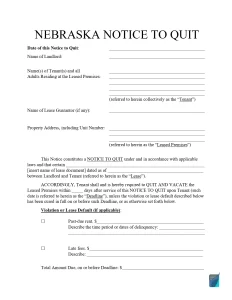Nebraska Eviction Notice Forms
The Nebraska eviction notice is a legal document a landlord must provide to a tenant to begin the process of removing a tenant. This notice, required by state law, is a formal request for the tenant to resolve a specific issue, such as unpaid rent or violation of lease terms, or to vacate the property. The eviction notice form and the time given to the tenant to remedy the situation or leave the property can vary based on the reason for removal.
If the tenant does not comply with this document, the landlord in Nebraska can file an eviction lawsuit (forcible entry and detainer action) in the county court. The tenant will be served with a summons to appear in court, and a judge will hear the case.

Build Your Document
Answer a few simple questions to make your document in minutes
Save and Print
Save progress and finish on any device, download and print anytime
Sign and Use
Your valid, lawyer-approved document is ready
Nebraska Eviction Laws
Nebraska Revised Statutes, Section 76-1431, outlines specific procedures and legal grounds for eviction due to various forms of noncompliance. One critical aspect of Nebraska’s eviction laws is how they address nonpayment of rent. If a tenant fails to pay on time, the landlord can issue a notice giving the tenant 7 days to pay before moving to terminate the rental agreement.
The laws also provide mechanisms for dealing with breaches of the lease that impact health and safety or other serious violations. Here’s a breakdown of actions a landlord can take under Section 76-1431:
- Notice of breach. The landlord must provide a written notice specifying the lease violations and the consequences if these are not remedied within a given timeframe.
- Opportunity to remedy. Tenants generally have 14 days to remedy the breach to prevent lease termination.
- Repetition of breach. If a similar violation reoccurs within six months, the landlord can terminate the rental agreement with just 14 days’ notice.
- Termination without Cure. For violent criminal or illegal drug activities specified under the statute, landlords can terminate the rental agreement with a 5-day notice without allowing the tenant to cure the breach.
Furthermore, landlords have the right to seek damages and obtain injunctive relief for any willful noncompliance. In such cases, reasonable attorney’s fees can be recovered, emphasizing the legal support for property owners against deliberate lease violations.
Nebraska Eviction Notice Laws Details
| Rent Grace Period | 7 days |
| Notice of Non-Payment | 7 days |
| Notice of Non-Compliance | 14 days |
| State Laws | Nebraska Revised Statutes, Section 76-1431 |
Eviction Notice Types Used in Nebraska
In Nebraska, the type of notice served depends on the specific situation and the grounds for eviction.
7-Day Notice for Nonpayment of Rent
Under Section 76-1431(2), when rent is not paid on the due date, the landlord must give the tenant a seven-day notice to pay the rent in full. If the tenant fails to pay within this period, they must vacate the premises, paving the way for the landlord to initiate further legal actions if necessary.
Notice for Cure or Quit
This notice, as specified in Section 76-1431(1), is issued for lease violations that affect health and safety or other serious breaches. The tenant is given 14 days to correct the issue. If the violation cannot be remedied, the tenant has 30 days to vacate the property. This notice ensures tenants can address issues before any final eviction action.
Immediate Notice for Illegal Activities
For severe violations such as engaging in violent criminal activities or illegal drug activities on the premises, landlords can issue an immediate notice under Section 76-1431(4). This notice demands that the tenant vacate within five days, highlighting the swift actions taken to protect the safety and well-being of other tenants and the property.
30-Day Notice for Month-to-Month Tenancy
As outlined in Section 76-1437(2), the landlord or the tenant can terminate a month-to-month tenancy with written notice at least thirty days before the desired termination date. This notice allows for a smooth transition and gives both parties sufficient time to make alternative arrangements.

Eviction Process in Nebraska
A series of legal steps govern the eviction process in Nebraska to ensure fairness and legality in removing a tenant.
Issuance and Service of Notice
The first step in eviction is issuing an appropriate notice to the tenant, depending on the reason. The notice must be delivered in person or via certified mail to ensure the tenant receives it.
Filing an Eviction Lawsuit
If the tenant does not comply with the notice, the landlord may file an eviction lawsuit, also known as a “forcible entry and detainer action,” in the appropriate county court. This legal filing must outline the reasons for eviction and provide evidence of the notice given to the tenant.
Court Hearing and Judgment
Once the lawsuit is filed, the court will set a hearing date for the landlord and tenant to present their arguments and evidence. During this hearing, the tenant can defend themselves against the eviction, potentially citing legal defenses such as retaliation or discrimination. A Writ of Restitution will be issued if the judge favors the landlord.
Writ of Restitution and Tenant Removal
This legal document authorizes the sheriff to remove the tenant from the property if they do not vacate voluntarily within the given time frame.
Remedies for Unlawful Eviction
Under Section 76-1430, the tenant has specific remedies if a landlord unlawfully removes a tenant from the premises or significantly reduces essential services like electricity, gas, or water. They may either recover possession of the property or terminate the rental agreement. Additionally, tenants can seek damages equivalent to three months’ rent and reasonable attorney’s fees.

Use our document builder to customize any template on FormsPal to your preferences. Here is a number of some other widely-used Nebraska forms we provide.
Other Eviction Notice Forms by State